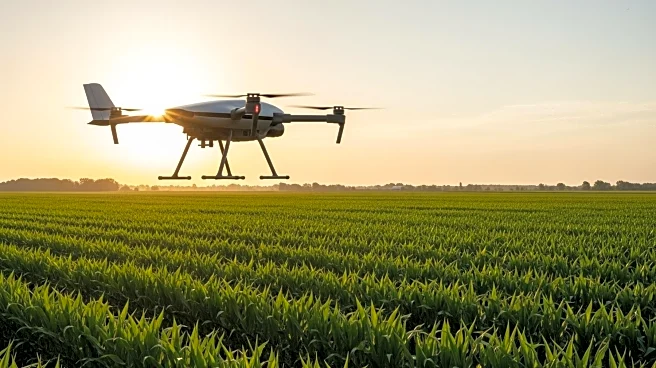What's Happening?
Iowa farmers are increasingly facing a 'data deluge' due to advancements in precision agriculture, which involves tracking numerous variables such as soil type, weather patterns, and pest presence. To manage this influx of data, agricultural organizations and researchers are turning to artificial intelligence (AI) for actionable insights. At the Iowa Ideas conference, experts discussed how AI can aid in profitability, yield outcomes, and plant genomics. Baskar Ganapathysubramanian from Iowa State University highlighted AI's potential to transform agriculture through technologies like drones and satellite data. The panel also included Karlene Negus, who is developing AI models for plant breeding, and Matthew Carroll from the Iowa Soybean Association, who emphasized the importance of building trust with farmers to encourage data sharing and technology adoption.
Why It's Important?
The integration of AI in agriculture is significant as it promises to enhance efficiency and productivity in farming practices. By providing insights into crop management and pest control, AI can help farmers make informed decisions, potentially increasing yields and profitability. However, the adoption of AI tools is hindered by concerns over data privacy and the lack of regulatory frameworks. Addressing these issues is crucial for widespread acceptance and implementation. The development of AI models for plant breeding could shorten the breeding cycle, offering faster solutions to agricultural challenges. As AI technologies evolve, they could play a pivotal role in ensuring food security and sustainable farming practices.
What's Next?
Future steps involve overcoming data privacy concerns and establishing regulatory frameworks to facilitate data sharing among farmers. Building trust through partnerships with organizations like the Iowa Soybean Association is essential for encouraging farmers to adopt AI technologies. Continued research and development in AI applications for agriculture are expected, with potential advancements in predictive modeling and pest identification. As AI tools become more accessible and reliable, their integration into farming practices could become more widespread, leading to transformative changes in the agricultural sector.
Beyond the Headlines
The ethical implications of AI in agriculture include the need for transparent data usage policies and equitable access to AI technologies for all farmers. Long-term shifts may involve changes in labor dynamics as AI tools reduce the need for manual data collection and analysis. The cultural dimension includes varying levels of technology acceptance among farmers, influenced by trust and familiarity with AI applications. As AI becomes more integrated into agriculture, it may redefine traditional farming practices and lead to new industry standards.









